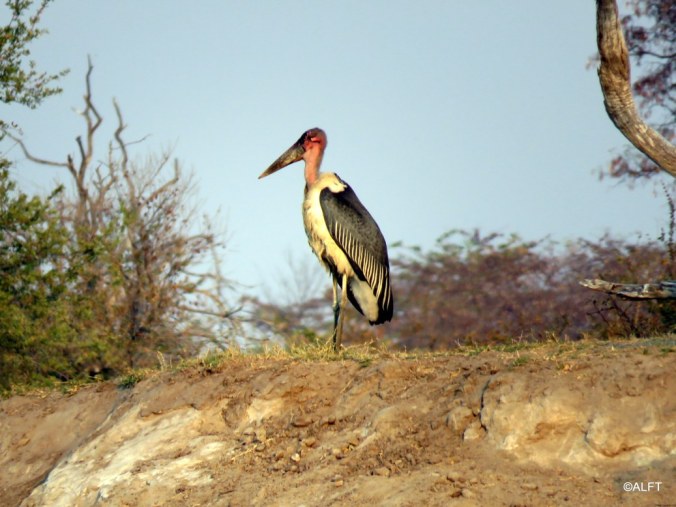
Cee’s Fun Foto Challenge – Feathers

Earlier this month Piet and I were invited on a trip to the Lower Zambezi, where we stayed at a self-catering lodge called Munyemeshe. This lodge is on the Zambian side of the Zambezi River where wildlife wanders freely between the Game Management Area (or GMA) and the nearby Lower Zambezi National Park.
It is a rustic place. There is no electricity, no wi-fi and – best of all – no mobile phone signal, so for seven glorious days we were cut off from the World, no worries, no cares, no constant pinging of the telephone.
Each night I would lie awake in the dark, listening to the bush sounds – the eerie call of the thick-knees, hysterical hyena scrapping over some left-over lion kill, the deep belly laugh grunting of hippos echoing across the water or the rustle and crack of elephants grazing from the tree above our chalet.
One was kind enough to leave us his calling card.

The days were spent on the boat, fishing, eating, relaxing, laughing and reminiscing with old friends about old times. And hippo watching.
In my last post I mentioned that I had rarely had the opportunity to photograph hippos out of the water. My luck changed on this trip.
I don’t recall ever having seen so many hippos at one time. At every turn in the river, in each inlet and on every sand bank we were met with the glowering stare of at least one of these beasts. Pods of fat, shiny bodies sunned themselves, soaking up the weak winter sunlight – regardless of the time of the day.
It was a hippopotophile’s dream.



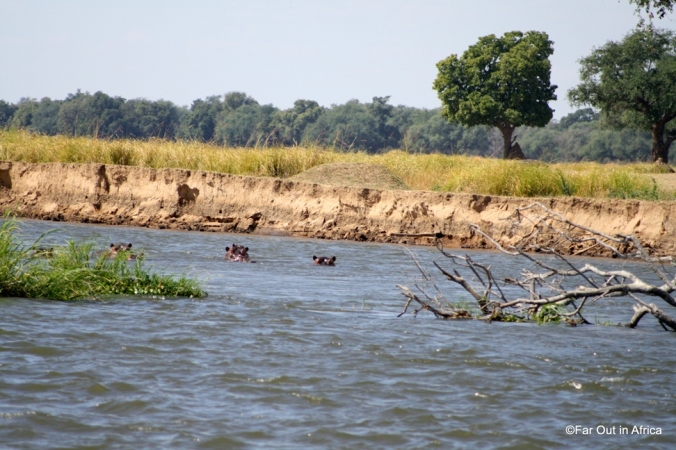
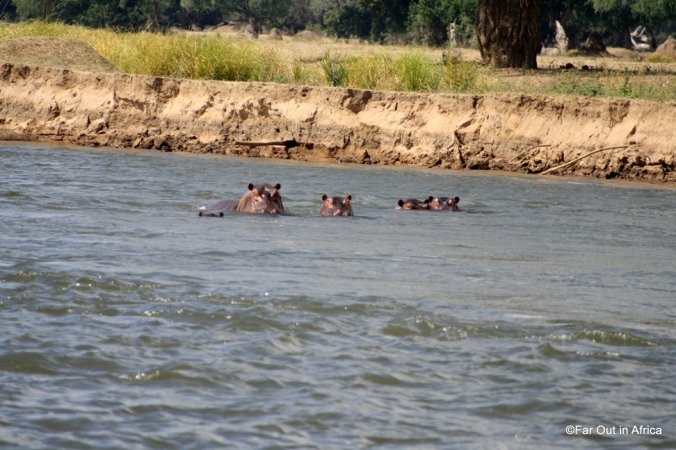






Hippos spend most of the day wallowing about and grunting in the river, leaving the water at dusk to graze on land through the night. I have rarely been lucky to capture decent photos of hippos out of the water because light at that time of day is poor and I am usually bobbing about on a boat, so it is difficult to keep a steady hand. A while back I was lucky and managed to get a few decent shots, which I have shared in my Hippo Series. You can see them here, here and here.
They may look cute and cuddly but in reality hippos are not your friend.
Being territorial animals, hippos don’t like it when people invade their personal space, and like all mothers, they are also fiercely protective of their young. So woe betide anyone who looks like they might be a threat to their wrinkly offspring. We always stay far away from hippos and try not to come between them and the land (or adults and their babies).
It is reputed that hippos have caused the deaths of more humans in Africa than any other large wild animal and most of their victims have been subsistence fishermen in makoros (a canoe-type boat made from a hollowed out tree trunk). They don’t actually eat people, but they do bite – their teeth are very long. Usually the hippo overturns the boat, and since the majority of the fishermen are unable to swim, many of the deaths are through drowning. Occasionally people have been unfortunate to come across a hippo on land and if they were unable to outrun the hippo (hippos can run 23Km/h) the result is always violent and often results in death.









Yesterday morning I hadn’t yet put on my glasses when I surfaced from the bedroom and went into the lounge. I glanced across at the fish tanks, as I normally do, and noticed something strange. There appeared to be a mythical, multi-legged beast with two heads writhing around on the floor of the tank.
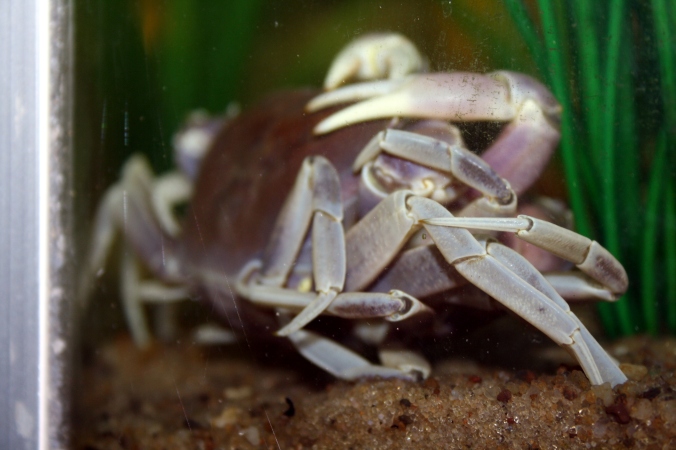
Skylla?
Glasses on, I peered closer. It seems there was a wedding last night.  I made myself a cup of coffee, pulled up a chair and settled in to watch the show. (I know this might seem like a weird thing to do, but it’s not every day you see a pair of river crabs mating in your living room.) Three hours and a couple more cups of coffee later things had not progressed much, so I turned to Google to find out what I would be missing if I left them alone to carry on their, um, business … What I learned was that crabs usually mate soon after moulting, while their outer shells are still relatively soft and supple. Also that females of many African river crabs species (Potomanautes sp.) ‘give birth’ to live, perfectly formed baby crabs – unlike sea crabs which lay eggs that hatch into a larval stage before metamorphosing into little crabs. Another thing I learned is that the crab mating act can sometimes take many days to finish (!), so I gave up being a voyeur and went to work. In the evening when I got home they were still at it and only finally parted at around 8pm. I leave you with a short video I took. This is pretty much as exciting as it got and I think you will understand why I didn’t stick around to watch more.
I made myself a cup of coffee, pulled up a chair and settled in to watch the show. (I know this might seem like a weird thing to do, but it’s not every day you see a pair of river crabs mating in your living room.) Three hours and a couple more cups of coffee later things had not progressed much, so I turned to Google to find out what I would be missing if I left them alone to carry on their, um, business … What I learned was that crabs usually mate soon after moulting, while their outer shells are still relatively soft and supple. Also that females of many African river crabs species (Potomanautes sp.) ‘give birth’ to live, perfectly formed baby crabs – unlike sea crabs which lay eggs that hatch into a larval stage before metamorphosing into little crabs. Another thing I learned is that the crab mating act can sometimes take many days to finish (!), so I gave up being a voyeur and went to work. In the evening when I got home they were still at it and only finally parted at around 8pm. I leave you with a short video I took. This is pretty much as exciting as it got and I think you will understand why I didn’t stick around to watch more.
My interest in aquaria was rekindled a couple of years ago when First Born and his delightful English Lass built me a 720 litre fish tank for Christmas.
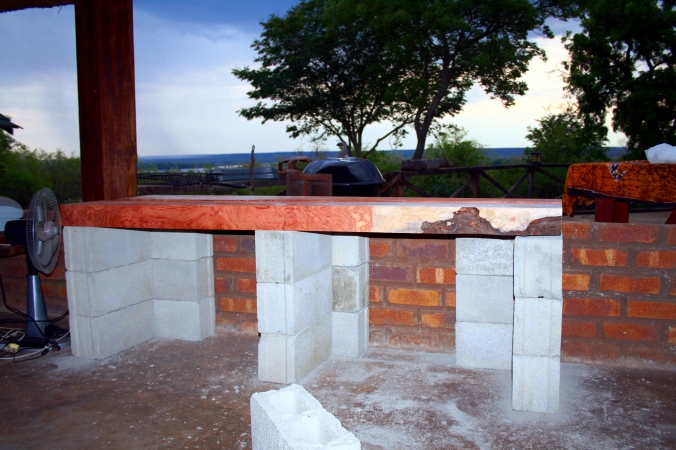
Building the stand
We collected sand from a beautiful beach on a near-by island on the river. The sand is bleached white and squeaks when you walk on it.

Collecting sand

Catching stock



We don’t own a TV – only because we don’t want to, not because there is no service – and it was a novelty to have something to watch in the evenings.
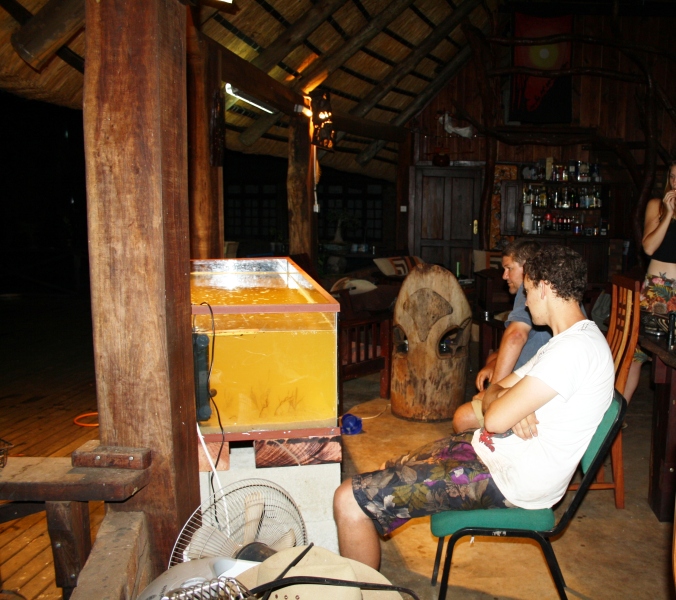
The filters had not yet cleared the water but that didn’t spoil the viewing

Tigerfish (Hydrocynus vittatus) – striped water dog
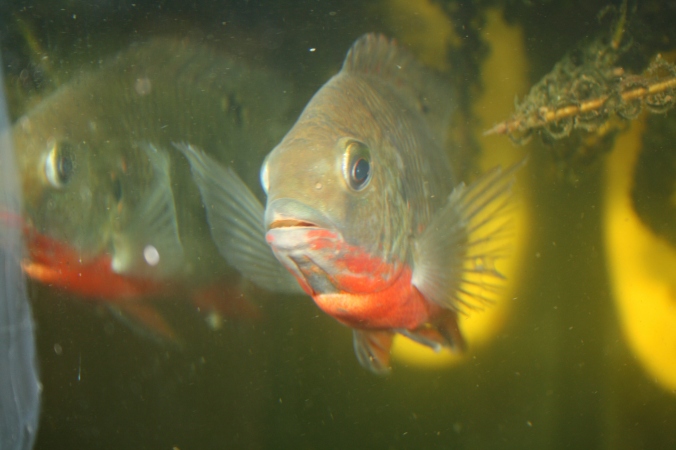
“Pink Happy”

A couple of Squeakers

A trio of Banded Jewelfish
A series of unfortunate events resulted in this tank breaking. We managed to salvage some of the glass and used that to build a smaller tank but we had to release many of the fish back into the Zambezi.
Knowing my passion for fish keeping, this last Christmas Piet had another tank built for me while I was away in the UK visiting family and I returned to the most wonderful surprise.
My next project will be to create a ‘planted tank’, using vegetation that grows here in the Upper Zambezi River. In the mean time Piet and I love to sit of an evening, sipping on a Mozi Lager and watching our fish live out their lives in our living room.
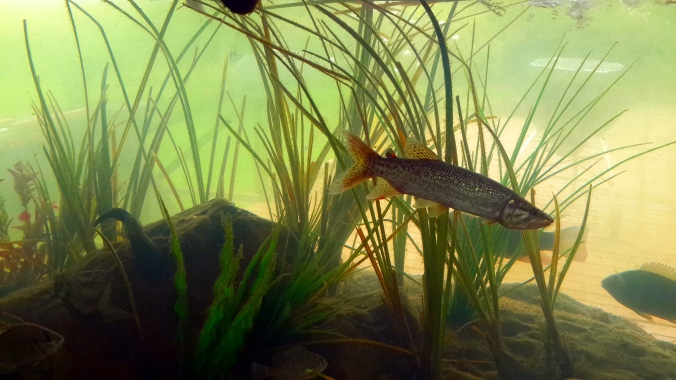
African Pike
"Summer is the Season of Inferior Sledding" -- Inuit Proverb. Martha Ann Kennedy's Blog, Copyright 2013-into perpetuity, all rights reserved to the author/artist.
The ramblings and photos of a Naturalist
For Exceptional People Everywhere
Join me in the cold, dark, life-sustaining NE Pacific Ocean to discover the great beauty, mystery and fragility hidden there.
Keeper of fluttery thoughts
Exploring the Reptiles and Amphibians of Africa
Medieval History, Pop Culture, Swearing
Live Life Write
Columns. Letters. Rants. Stuff.
My thoughts, sentiments, and scribbles on womanhood
Steve Harrison and Janine King's other Hot and Sticky web site
Little windows into my world.
Just Doing My Best to Communicate Science
Fun With SCIENCE!
trials and tribulations of a quaterlife crisis
For people with Non-24-Hour Sleep Cycles
Lisa Batten Kunkleman
BLIND WILDERNESS
an irreverent look at UK politics
Ruminations and reflections on the world of literature...
debunking the reasons people don't vax
A LOT OF P'S WITH A BIT OF QUIRKINESS THROWN IN FOR GOOD MEASURE.
Growing with gratitude for life's challenges
Wits End Photography
Exploring my world with pictures and words.
photography, poetry, paintings
Photographing.... that one moment in time...
All Is One With Our Creator
age is just a (biggish) number
Everyone Has Something To Teach Us
To participate in the Ragtag Daily Prompt, create a Pingback to your post, or copy and paste the link to your post into the comments. And while you’re there, why not check out some of the other posts too!
Creative Exploration in Words and Pictures
To See a World in a Grain of Sand...
I write to figure out what is left
Fun, Photography & Friends
An onion has many layers. So have I!
Stories, Prompts, and Musings
A blog about blood-brain barrier, science, metal, old-school gaming and other geeky stuff
Looking at the conflict around the world.
Do you want to beat the bite of mosquitoes? This is a summary of research projects and publications dealing with mosquitoes, mosquito-borne disease, insect repellents, urban wetlands and urban ecology (as well as other Medical Entomology activities) by Dr Cameron Webb (University of Sydney & NSW Health Pathology)
Fighting pseudoscience and quackery with reason and evidence.
Seldom original. Often wrong. Occasionally interesting.
Studying the glorious work of those who want to do your thinking for you